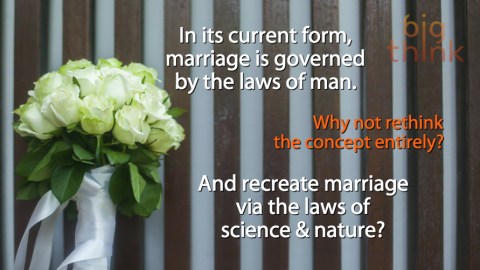Genius or Crazy? Get Married By the Laws of Physics.

Genius or Crazy presents innovative and unorthodox solutions to complex problems. Current technological feasibility is irrelevant: This is a thought exercise. Is it genius? Is it crazy? You decide.
Read on below, vote, and let us know what you think in the comments.
Jonathon Keats is an experimental philosopher, which might very well be one of the cooler titles to sit beneath a name on a business card. What does an experimental philosopher do? It’s a tricky concept to put into words, but we can start by saying most of Keats’ work dances playfully between art and science. In 2004, he famously attempted to genetically engineer God. In 2006, he choreographed a Honey Bee Ballet by strategically planting flowers in a way that would influence bees’ movements as they pollinated. He has developed customized versions of the metric system, sold real estate in theoretical other dimensions, and composed a sonata to be played among the stars.
Keats says he begins each of his experiments with a naive question. He’ll synthesize a thought experiment around it that allows for a new perspective on the topic. Then — and this is where he diverts from your typical garden-variety philosopher — he tests the experiment in real life. Keats’ work is the abstract and theoretical in action. He’s been called “a poet of ideas” by The New Yorker and a “multimedia philosopher-prophet” by The Atlantic.
For today’s edition of Genius or Crazy, we point eyes at Keats’ latest project: matrimony governed not by the laws of man or God, but by the laws of nature. He’s bringing this concept to the Life is Beautiful festival later this year in Las Vegas:
“A Las Vegas hotel is experimenting with a different kind of marriage ceremony: Instead of hiring a justice of the peace, you can now be married by the power of quantum physics.
‘Marriage is such an incredibly fraught topic,’ says Keats. … ‘So much is invested in it. So much of what people want out of life is put into this legal contract. It seems to me like we really need to investigate other possibilities … in order to think about whether there are other ways we can connect.’
The new ceremony is based on the concept of quantum entanglement — a somewhat magical-sounding phenomenon where two particles remain connected in their physical state even when they’re far apart. Whatever happens to one particle will instantly happen to the other.”
Keats discussed this concept with us a few years ago in the video below:
“Quantum entanglement involves two more particles becoming effectively one in the same even if they are separated across the universe from each other. When they are entangled, anything that happens to one instantaneously happens to the other as if it had been done to the second particle. That quality seems an awful lot like what marriage is about, this way in which you can lead separate lives and yet you still are somehow bound and whatever comes the way of one person in a relationship also applies to the other.”
This is the basic gist of Keats’ idea: Getting married by a priest or at a courthouse can feel underwhelming, so why not rethink weddings by ditching the lame old officiants and replacing them with science?
The nuptial entanglement process takes place in an “entanglement apparatus” to be set up at Las Vegas’ Art Motel from September 25 to 27. The apparatus consists of a nonlinear crystal that will entangle photons when exposed to the full spectrum of solar radiation. Those entangled photons will bounce around the space by ways of thousands of hanging mirrors and prisms, eventually setting on the bodies of the people getting “married.” As mentioned above, the entangled particles serve as a natural metaphor for marriage. Overall, Keats’ project strives to prove the laws of nature can be just as romantic as the traditional wedding tropes.
Keats has hope that a city like Vegas — which hosts 350 weddings per day — will see a need for continued use of the entanglement apparatus beyond the festival.
One word of warning though: Just because you and your sweetheart stepped into the apparatus doesn’t mean you can start filing joint tax returns. Remember that we’re dealing with the theoretical here. It’s like walking through a living metaphor. There are very few instances of paperwork when walking through a living metaphor and none of them apply here. If you want all the perks of being married, send out for a justice of the peace.
But if you want to test out an experimental philosopher’s attempt to establish a natural framework for marriage based on scientific tenets, maybe start thinking about Vegas.
It’s time to find out what you think. Is Keats onto something here with the idea that a union between lovers need not be so surface as to rely on legal or religious sanction? Would you ever consider a marriage by science? Or is he merely an artist making an interesting point? Is this all just a silly stunt?
Genius or Crazy?
Photo credit: wandee007 / Getty iStock





